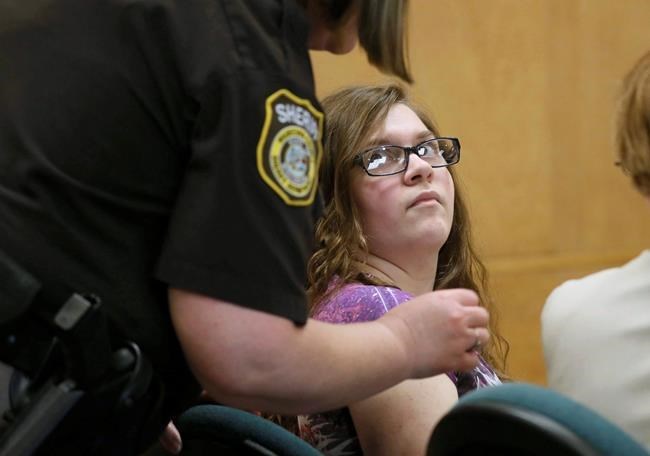
FILE - In this Feb. 20, 2017 file photo, Anissa Weier, appears in court in Waukesha, Wis. A jury is set to begin Monday, Sept. 11, deciding whether Weier, one of two girls accused of trying to sacrifice a classmate to please the horror character Slender Man was mentally ill during the incident. The victim, Payton Leutner was stabbed 19 times in May 2014. All three girls were 12 years old at the time. Leutner survived her wounds, and Weier and her friend, Morgan Geyser were captured later that same day. (Michael Sears/Milwaukee Journal-Sentinel via AP, Pool, File)
Republished September 10, 2017 - 2:27 PM
Original Publication Date September 10, 2017 - 7:36 AM
MADISON, Wis. - A jury this week will begin weighing the mental competence of a girl accused in the stabbing of a classmate to please a fictional horror character known as Slender Man.
Jury selection begins Monday in Waukesha in the trial to determine 15-year-old Anissa Weier's competency. It could take up to two weeks. Here are a few key things to know about the case and the trial:
___
WHAT HAPPENED?
Prosecutors allege that Weier and her friend, Morgan Geyser, lured classmate Payton Leutner into a Waukesha park in May 2014 and stabbed her 19 times. The girls have said it was an effort to please Slender Man and become his servants, or to keep the character from attacking their families. All three girls were 12 years old at the time. Weier and Geyser left Leutner for dead and starting walking to the Nicolet National Forest, where they hoped to join Slender Man in his mansion. A passing bicyclist found Leutner, who survived, and Weier and Geyser were captured later that day.
___
WHAT ARE THE CHARGES?
Prosecutors charged both girls with being a party to attempted first-degree intentional homicide. Weier struck a deal with prosecutors in August in which she pleaded guilty to being a party to attempted second-degree intentional homicide, essentially acknowledging she committed all the elements of the offence. But she also has pleaded not guilty due to mental illness, meaning she believes she isn't responsible for her actions. The jury will decide whether she was indeed impaired.
___
WHAT'S AT STAKE FOR WEIER?
How she'll spend the next few years of her life. A plea deal struck by prosecutors and her attorney calls for 10 years in prison if she's found not to have been mentally ill, though the judge could sentence her to as many as 25 years. If she's found to have been mentally ill, she would be committed to a mental hospital for at least three years.
___
WHAT DOES THE EVIDENCE REVEAL ABOUT WEIER'S MENTAL STATE?
Weier told a judge during her plea hearing in August that she believed Slender Man would attack her and her family if she didn't kill Leutner. Psychologists have testified that she suffered from persistent depression and a delusional disorder linked to schizotypy, a diminished ability to separate reality from fantasy. It's unclear what evidence Weier might present. Her attorney, Maura McMahon, didn't return a voicemail. Waukesha County District Attorney Susan Opper declined to comment on evidence or strategy.
___
HOW WILL THE TRIAL WORK?
Jury selection will begin Monday, and Waukesha County Judge Michael Bohren has set aside up to two weeks for the trial. A valid verdict needs at least 10 of the 12 jurors to agree. The defence has the burden of proving Weier was mentally ill at the time of the attack and whether, as a result of that illness, she couldn't appreciate how wrong her actions were or follow the law.
___
WHAT ABOUT GEYSER?
She has pleaded not guilty to being a party to first-degree attempted homicide. Her trial is set to begin Oct. 9.
___
WHAT DO EXPERTS THINK ABOUT THIS CASE?
In Wisconsin, anyone 10 or older charged with attempted first-degree or second-degree intentional homicide is considered an adult. Cecelia Klingele, a University of Wisconsin law professor who researches sentencing policy and the consequences of convictions, calls the case a tragedy for everyone involved. The victim suffered serious injury and the other girls clearly needed guidance that they didn't get, she said. But trying to punish children through a system designed for full-grown adults doesn't make any sense, since in almost all other circumstances, the state recognizes that children are not as responsible as adults for their actions.
___
Associated Press writer Carrie Antlfinger in Milwaukee contributed to this report. Follow Todd Richmond on Twitter at https://twitter.com/trichmond1 .
News from © The Associated Press, 2017